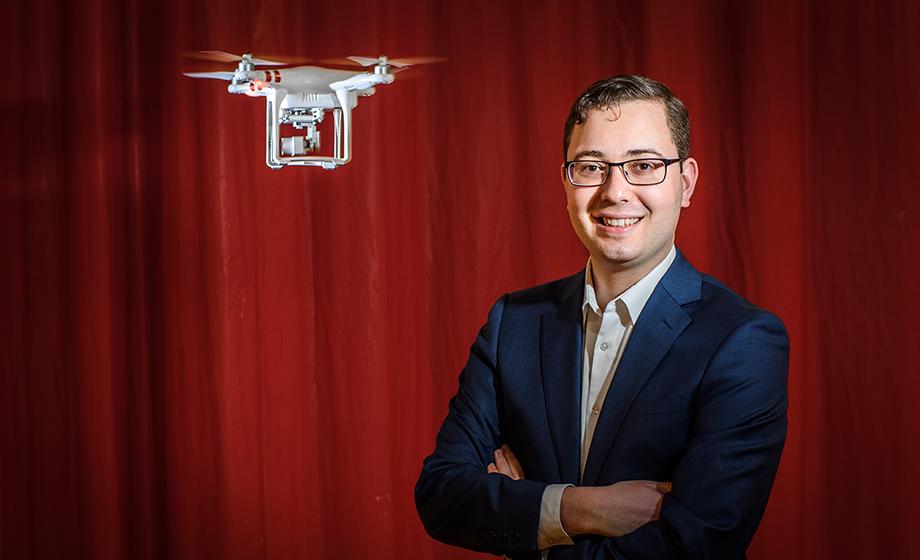
Some people want to place their big idea into the pipeline. Andrés Gvirtz ’18 prefers that his soars over it.
Gvirtz was the winner of the $5,000 first-place prize in the Ureka Big Idea Challenge for his company, CompactCopters, through which he hopes to develop a drone that will revolutionize the pipeline-inspection industry.
The Ureka competition is sponsored by the Innovation & Entrepreneurship Program to encourage Clark students to build a business model for their original idea.
Read more about Andrés Gvirtz’s internship experience at Clark.
Gvirtz and his high school friend, Henricus Basien, had flown drones for fun in their native Germany. When they decided to build their own drone, they had no direction in mind, but thought they would give it a shot. Then life interceded. Gvirtz came to Clark to study psychology and economics; Basien went to the Netherlands to study aeronautics.
The pair decided to revisit their drone project two years ago — this time, with a little more savvy.
Their long friendship has cultivated a deep sense of trust, though Gvirtz insists their personal connection is not the sole driver for their fledgling business. “Our skills complement each other well,” he says. That interconnection led them to develop a specialized drone whose flight time outlasts the competition, an invaluable advantage in the market.
Basien is the designer; Gvirtz, the analyst and pitchman. “We were in New York for a presentation last year at the International Conference by Business Today,” Gvirtz recalls. “The night before, Henricus realized a factor was wrong and spent a lot of time [working to fix it]. I was like, ‘This doesn’t matter right now! We’re presenting tomorrow!’ ”
In the end, Gvirtz acknowledges, it did matter. “If he hadn’t fixed the equation, we wouldn’t have had a product that flies.”
Still looking to improve on their drone, the duo became a trio in summer 2016 with the addition of Samuel Liu. The Harvard physics student has helped CompactCopters build predictive models that detect flight issues before the drone is even off the ground, a feature Gvirtz says makes CompactCopters more cost-effective.
Gvirtz treats problems like puzzles, and builds analytical models to answer queries Google can’t. For the drone, his first big question was one of practicality: How could it best be used?
He explored a number of industries, ultimately redesigning the product to fit their target market: the oil pipeline industry. Currently, helicopters are rented and equipped with special scan technology to detect hotspots of erosion. With CompactCopters, Gvirtz hopes he and his team can increase the frequency of inspections and save the industry millions of dollars. “Pipelines aren’t inspected enough,” he explains.
The team designed a product that impressed the Ureka judges, all of them Clark alumni who are also entrepreneurs. The night of the competition, Amy Whitney, director of the Innovation and Entrepreneurship program, noted that the judges focus on a number of criteria, including the feasibility of the concept, the strength of the business model, how the company intends to use the funds, and the overall quality of the presentation.
In his presentation, Gvirtz explained the advantages and potential uses of a CompactCopters drone, and acknowledged areas that needed improvement. With the award, he and his team intend to build a prototype.
Gvirtz, who will study psychology at the University of Cambridge this fall, is optimistic that CompactCopters will fill a critical need. “We hope for the best,” he says, “but either way it was worth it.”


